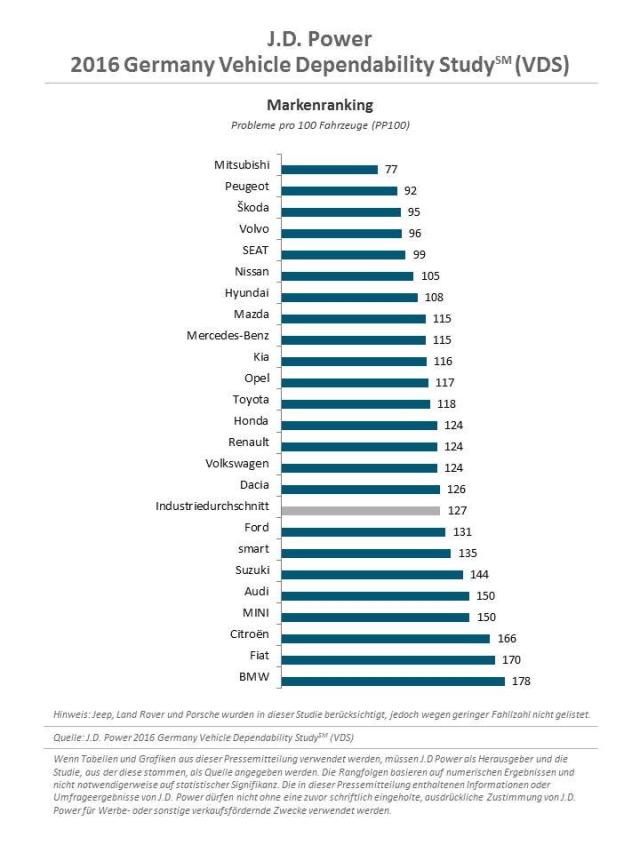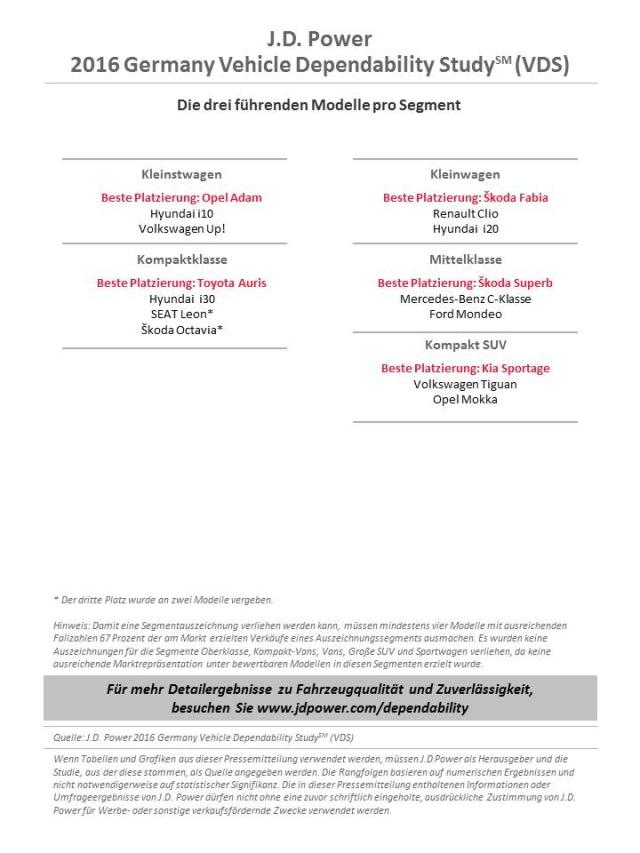Technology-Related Problems Limit Improvement Gains in Germany Vehicle Dependability Study
Škoda Has Two Models That Receive Segment Awards; Kia, Opel and Toyota Each Have One
MUNICH: 20 July 2016 — A decline inengine/transmission and interior problems is helping drive a slight improvement in vehicle dependability in Germany, according to the J.D. Power 2016 Germany Vehicle Dependability StudySM (VDS), released today in association with AUTO TEST.
The study measures problems experienced during the past 12 months by original owners of vehicles in Germany after 12-36 months of ownership. The study examines 177 problem symptoms across eight categories: engine and transmission; vehicle exterior; driving experience; features/controls/displays (FCD); audio/communication/entertainment/navigation (ACEN); seats; heating, ventilation and cooling (HVAC); and vehicle interior. Overall dependability is determined by the number of problems experienced per 100 vehicles (PP100), with a lower score reflecting higher quality.
The overall industry average is 127 PP100, down from 129 PP100 in 2015. The improvement is due in large part to a 2 PP100 decrease each in the engine/transmission and interior categories. On the other hand, four of the six most frequently reported problems are related to ACEN—the most prevalent of which pertain to Bluetooth connectivity and radio reception—with the problem count in this category as a whole 0.5 PP100 worse than last year.
“Automakers are focused on the quality of their vehicles, so it’s encouraging to see a modest improvement in dependability,” said Dr. Axel Sprenger, senior director of European automotive operations at J.D. Power. “The increase in technology-related ACEN problems has two sources: usability problems that owners are reporting and the fact that market penetration as well as usage rates of these features are increasing. We expect technology in vehicles to continue to expand, making this a key area of concentration for auto manufacturers.”
Sprenger noted that dependability is critical, not only in helping automakers manage warranty costs, but also in fostering customer loyalty and advocacy.
“Dependability has a direct impact on purchase decisions and brand loyalty,” said Sprenger. “Customers in Germany expect their vehicle to be problem-free, not only in the first 90 days, but also during the first three years of ownership. When owners experience even a single problem with their vehicle, this can be the initiation of losing confidence in the vehicle and the brand.”
Among owners who experience no problems with their vehicle, 55% say they “definitely will” purchase/lease the same make again and 68% say they “definitely will” recommend the make/model to others. In contrast, among owners who experience one problem with their vehicle, only 46% say they “definitely will” purchase/lease the same make again and 60% “definitely will” recommend the make/model to others. Intended loyalty and advocacy continue to decline with each additional problem. Among customers who experience five or more problems with their vehicle, loyalty drops to 28% and advocacy drops to 32%.
Not All Problems Are Created Equal
When customers take their vehicle to a dealership to address the problems they experience, there is a wide discrepancy in the ability of dealers to fix these issues based on the problem being serviced. The VDS measures both defect and design problems. Defect problems are things that break or do not work as expected, while design problems are those that work as engineered but do not meet the owner’s expectations. Defects, such as a light bulb or battery failure, can usually be fixed at a dealership. However, design problems, which include excessive wind noise and most ACEN problems, are often difficult, if not impossible, for a dealer to fix, and thus remain throughout the life of the vehicle.
“This illustrates the critical nature of ACEN problems, as there is little that can be done to correct them. And getting closer to the decision to replace their car, customers continue to struggle with these issues,” said Sprenger.
Rankings
Škoda has two models (Fabia and Superb) that receive segment awards, each for a second consecutive year. Opel (Adam), Kia (Sportage) and Toyota (Auris) each receive one award.
Mitsubishi ranks highest with a score of 77 PP100. Peugeot ranks second with 92 PP100, followed by Škoda with 95 PP100; Volvo with 96 PP100; and SEAT with 99 PP100.
The 2016 Germany Vehicle Dependability Study is based on responses from more than 15,000 owners of 2013-2015 model-year vehicles. The study was fielded from February through April 2016.
Additional study results are published exclusively in the 5/2016 issue of “AUTO TEST – Der Kaufberater, which will be on sale beginning July 27, 2016.
Media Relations Contacts
Mark Lendrich; J.D. Power; Munich, Germany; Tel: +49 (0)89-288 03 66-11; mark.lendrich@jdpa.com
Tobias Franzke; AUTO TEST; Tel: +49 (0)9122 63 13 100; tobias.franzke@autobild.de
John Tews; J.D. Power; Troy, Mich., USA; +1 248-680-6218; media.relations@jdpa.com
About J.D. Power and Advertising/Promotional Rules www.jdpower.com/about-us/press-release-info
About AUTO TEST
AUTO TEST is a member of the international AUTO BILD group published by Axel Springer. Since 2003, AUTO TEST has been the leading special interest magazine for readers who are planning to buy a new car. More than 500 cars are tested each year, with over a million kilometers driven to provide readers with detailed and objective model reviews to help them choose the best car for their money. Readers can also find tips on cutting running costs, used cars, service, finance and accessories.

